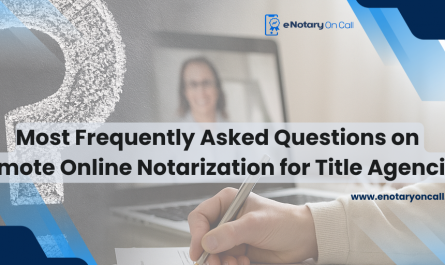
For many people, even notaries, the use of new technology for notarizations has been puzzling. Remote Online Notarization has been available for many years, but its acceptance has surged since Covid-19. Everyone is aware of the alternative, the traditional notarization procedure, which has been in use ever since “state court approvals” were first introduced. The goal of notarizing the document is the same for these two procedures, even though their processes are very different.
To better inform you, we’ll explore the distinctions between these two notarization procedures and delve into detail about both traditional and remote online notarization (electronic notarization).
What is involved in traditional and remote online notarization
The most common type of notarization that the public and Notaries are familiar with is traditional notarization. In this, signers notarize their documents using a handwritten signature and a notary stamp by a public notary. In this case, the signer must be physically present or face-to-face at the notary’s office.
In contrast to this, with a remote online notarization (RON) service offered by online platforms like eNotary On Call, the notary and signer meet virtually from separate locations, and the document is notarized utilizing audio-visual communication technology and electronic signatures and stamps. Additionally, the notarization procedure is recorded for future reference.
During a RON session, the signer signs a paper document while communicating live with the Notary public. The signer may be required to sign an online declaration stating that the document they signed and sent to the Notary is the same. The document is then sent to the Notary for notarization.
Type of documents required in RON & Traditional Notary
Each type of notarization, such as Traditional and RON, has different document format specifications. A physical paper document with an original written signature is required for traditional notarization. While an electronic record, an electronic signature, and an electronic notary stamp are needed for online notarization. Additionally, it differs according to state legislation; however, for remote online notarization, most states follow roughly the same procedures.
Identifying Signer
In the traditional notarization process, the signer must provide the notary with adequate identification in the form of a government-issued ID card like a driver’s license. In accordance with the criteria of their state’s Notary acts, the Notary may also ask for the presentation of witnesses who can attest to the identity of the signer. These witnesses must know them personally.
While the Virtual Notary (RON) requires signers to follow the knowledge-based authentication (KBA) process, where the signer must correctly answer questions about their background; credential analysis, where the signer’s ID is checked using an automated process; remote presentation, where the signer presents ID to the Notary on camera; and finally, biometrics.
Notary signatures and seal
For a traditional notarization, the signer must come in person and provide the documents they want notarized. The notary verifies the documents to be notarized once he arrives at the appointment to make sure they are in order. The document is finally notarized once the notary certifies that it is valid, by attaching the seal and signature.
Through virtual notary or online notary services, the signer notarizes the document electronically. The notarial certificate is then digitally signed by the notary, who stamps the document with the electronic seal and finally notarizes the document.
Recording the journal entry
The traditional method of notarization maintains the signer’s information, together with the type of document information, in both a physical and digital entry and a journal entry. This is when the notarization procedure is complete.
A digital journal entry is typically required in remote online notarization, and the notarization is audio-visually recorded for future use. The recording is safely kept for future reference on the electronic notarization platform.
Conclusion
There are traditional and remote notarization processes that work best. When it comes to saving time, online notarization is the most convenient option. People are busy with their hectic schedules and unable to set aside time to complete tasks that call for several appointments, as in the case of a traditional notary. Therefore, remote online notarization is widely used to notarize documents quickly, anywhere, and at any time.
Visit eNotary On Call, with the most advanced remote online notary services and the cutting-edge electronic notarial platform of 2022.



